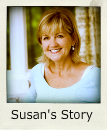My husband and I have very different tastes in movies. Wait, it’s not what you think.
He loves romantic comedies.
LOVES them. We’ll be sitting around some nights with nothing to do and he’ll turn to me, all earnest and sensitive, and say: “Wanna watch Notting Hill?”
If I say no, he’ll move on to The Holiday, French Kiss, and Return To Me.
Excuse me, but the wife dies in the first ten minutes of Return To Me.
And then comes back as Minnie Driver. Why would I want to watch this movie more than once?
As for me, I’m constantly sliding one of the Lord of The Rings movies into the DVD player. (I often give myself pep talks, and one of the most common ones is “For Frodo.” It works in pretty much every situation.) I’m also always up for a little Braveheart, Gladiator, Kingdom of Heaven.
I have a friend who has done a bit of screenwriting. She tells me that most screenplays are 120 pages long, for a two-hour movie. That breaks down to about a page a minute.
Picture, if you will, a romantic comedy. We’ll use When Harry Met Sally, for our purposes.
According to my screenwriting pal, page 30 is supposed to be the First Turning Point. This is also known as the Inciting Incident. This would be the part when Harry and Sally come from different relationships, meet, and get in the car to drive to New York together.
Some of us are on page 30 right now, and we need to hear that there are more pages to come in our stories. For you, the message you need to hear at this moment is this: It won’t always be like this.
The plot will continue and resolution will occur.
Page 60 is supposed to be Act 2: The Confrontation. This is when Harry and Sally get to New York, and they pretty much have to acknowledge their relationship. If you’re at page 60 right now in your life, you may be saying something like this to yourself: “I’m not going to continue anymore in this relationship/this job/this dysfunction. It ends today.”
Page 60 is about recognizing and naming what is, not necessarily accepting it.
Next is Page 90. Resolution. Act 3. When Harry and Sally get together at the New Year’s Eve party, sharing this famous phrase with the world: “When you realize that you want to spend the rest of your life with someone, you want the rest of your life to start as soon as possible.”
Page 90 is closure.
And, we’re done. Or not—maybe something else happens and the cycle starts all over again, perhaps in another totally unrelated area of life or possibly the exact same one. (See the ending of 500 Days of Summer—another hubby fave.)
Of course, the 120-page structure only applies to films.
We all know that the books of our lives can last much longer- or shorter.
Depending on one’s childhood, and how much information one wants to share about adolescence, some of us are well our way to producing a 7-volume boxed set of the days of our lives. Look out, Harry Pottah.
Our life stories can have similar arcs. But whether you are on page 60 or page 600 of your 11-part miniseries, your story has a point. It has a message, a purpose, meaning and significance that is beyond you, and almost certainly beyond what you can see or receive at this time.
In the year 2000, my husband Chris and I went to Oxford University, so he could study Jane Austen. (And now you see why the romantic comedies.) He actually wanted to only study Pride and Prejudice for six weeks straight, but when he asked if he could do that they said “Um, no. You actually have to study all six of her novels.”
That’s how they roll across the pond.
We lived for a summer in a house in Oxford with six other American college students. When we moved in, and everyone was getting to know each other, they would ask each other, “What are you studying?” And one would say: “Oh, I’m studying 15th century Russian economics.” “Oh, I’m writing about the French Revolution.” “I’m studying Japanese Samurai warriors in the 1200’s.”
And they would ask Chris: “What are you studying? And he’d say “Jane Austen”, and they’d say “Oh……….….yeah. Neat. Isn’t she like,……..Emma? Sense and Sensibility? And he’d say yeah, she’s brilliant, and here’s why: her characters change. They grow and transform and at the end of the story they are not the same as they were when the story started.
Look at Elizabeth Bennet, the main female character in Pride and Prejudice. By the end of the novel, she has been humbled; brought low by her flaws and judgment that she so cheerfully applies to everyone else and is now being applied to her by Fitzwilliam Darcy. There is redemption in Jane Austen’s stories. The characters are imperfect and they make mistakes and yet they learn.
What you’re going through right now? This plot twist on page 45? The bad news on page 63, the awful fight on page 87? This is good literature. Epic drama.
But it’s not just that; it’s more.
Or it can be more, if you’re willing to look at it a different way. A self-leadership way.
Donald Miller says: It turns out that in nearly every great story in literature, the protagonist is transformed. The point of the story is the character arc, the change.
Just the same, an equally true and universally applicable rule in creating stories is that the characters don’t want to change. They must be forced to change. That’s the point of the inciting incident. Nobody wakes up and starts chasing a bad guy or dismantling a bomb unless somebody forces them to do so. The bad guys just robbed your house and are running off with your last roll of toilet paper, or a bomb is strapped to your cat. It’s that sort of thing that gets a character moving.
The inciting incident is the event that forces your character to move. The doorway through which they can’t return, how you get the story started in a certain direction. Humans naturally seek comfort and stability. Without an inciting incident that disrupts their comfort, they won’t enter into a story. They have to get fired from their job or be forced to sign up for a marathon A ring has to be purchased. A home has to be sold. The character has to jump into the story, into the discomfort and the fear, otherwise the story will never happen.
So jump in. Participate in writing the story of your own life. Exercise agency. Carpe Diem and all that. Go incite an incident.
Stop feeling your fear and start leading it.
No matter what page you’re on; tell a story you can be proud of.











Some thoughts:
Chris = my hero. Seriously. I just hope that I’ll be lucky enough to someday find a guy who backpacks with the guys all weekend and builds stuff all week and then comes home to watch When Harry Met Sally and read Jane Austen.
Also, thank you for this post…your well-timed words of truth are always such a God-send to me. And now I’m inspired to go out and face this day with courage – for Frodo!
This needs to be a talk given at Chapel. Seriously. Very encouraging post!
this is my 2nd time reading this post, and i think it’s a great one. i think the inciting incidences of my daughter being born deaf and my family imploding have truly been a gift to me. would i have dreamed either of those plotlines up? uh, no. and part of me wishes i’d been spared the pain they brought. but the deeper, more broken parts of myself, i am so grateful that my life got more messy, ugly, and hard to navigate. i couldn’t use the old roadmap anymore, and i couldn’t really find one that applied to my new circumstances. so i had to just change. but i believe my story (and hopefully my personal character) is a lot more interesting, empathetic and real now. in short, i think i am becoming a better person.